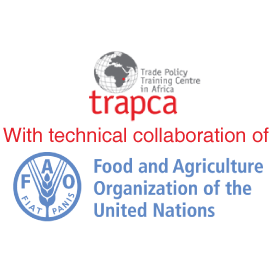
Contents
- Update on ATPPN
- COVID-19 may delay the July 2020 operationalization of AfCFTA
- Trade Facilitation advancements in EAC Region are being negatively impacted by Covid-19 related measures
- SADC Council of Ministers adopts COVID-19 regional Guidelines for harmonising and facilitating movement of critical goods and services
- COMESA puts in place a harmonized regional grading and classification system for Trade in Livestock
Update on ATTPN
ATPPN is an African community of practice that facilitates dialogue, information exchange and sharing of ideas related to trade and agriculture. It is an initiative of trapca with the technical collaboration of FAO. It seeks to create awareness on trade and agriculture issues with a bearing on African countries in the context of WTO issues and developments, RECs and RTAs with third parties and trade and agriculture developments in individual countries.
This year, similar to the past two years, ATPPN will conduct a regional dialogue with an expanded country representation. Further, there will be publication of policy briefs as well as an annual publication focusing on topical issues in the area of trade and agricultural.
Covid-19 may delay the July 2020 operationalization of AfCFTA
Following the launching of the operational phase of the AfCFTA at the Niamey Extraordinary Summit of Heads of State and Government of the AU on July 7, 2019, trading under the AfCFTA is scheduled to commence on 1 July 2020. The period between July 2019 and June 2020 was set aside for conclusion of the phase one operational instruments that include: Schedules of Tariff Concessions, the Rules of Origin and the Schedules of Specific Commitments on Trade in Services. In line with this, the Executive Council of the AU directed the AU Commission (AUC) to convene the necessary meetings to conclude the remaining work on Rules of Origin, schedules of tariff concessions and schedules of specific commitment on the five priority service sectors (financial services, communication, transport, tourism and business services) by end of March 2020 to enable the finalization of tariff offers and submission of the final report on Rules of Origin to the Extraordinary Summit to be held in South Africa.
Consequently, at the second meeting of AfCFTA Council of Ministers held on 14 December 2019 in Accra, it was agreed that AfCFTA Council of Ministers should meet in South Africa for an Extraordinary Summit on 30 May 2020 to approve all instruments under the agreement. This will be necessary to pave way for conclusion of all remaining operational instruments that also include: an online mechanism for monitoring and elimination of non-tariff barriers (tradebarriers.africa) and AfCFTA mobile application for businesses including digital payments system for goods and services; a Pan-African payment and settlement system; and the dashboard of the AU Trade Observatory, all of which are expected to accelerate the implementation of the AfCFTA.
However due the continuous impact of the novel Coronavirus Disease (COVID-19) infections that has brought global activities to a standstill, the meetings that were to facilitate conclusion of the operational instruments are among the growing list of cancelled and postponed AUC’s activities. This is in line with the Africa CDC Policy Recommendation for African Union Meetings and Travel During COVID-19 Outbreak that was issued by the AUC and updated on 12 March 2020.
Despite the recent swearing-in ceremony of the first Secretary-General of AfCFTA, Wamkele Mene on 19 March 2020 in Ethiopia, as the rate of COVID-19 infections continues to surge on the continent, countries are taking some drastic decisions that include travelling restrictions and lockdowns, it is now likely that the Extraordinary Summit scheduled to take place on 30 May 2020 in South Africa will be postponed.
Consequently, the postponement of the various meetings including the upcoming Extraordinary Summit is likely to result in delaying the scheduled July 1, 2020 commencement of trading under the AfCFTA.
Trade Facilitation advancements in EAC Region are being negatively impacted by Covid-19 related measures
With border closures announced by almost all EAC Partner States with the aim of containing the spread of the corona virus pandemic, the road transport sector in EAC has been hardest hit. The road transport accounts for over 60 percent of goods movement from ports of entry to the region.
Transporters have observed that there is confusion in the manner directives are being issued by different governments in regard to management of their borders and that this is being compounded by lack of coordination between government agencies and the private sector. Transporters have further observed that the closure of Kenya’s borders with Uganda and Tanzania, with minimal truck movement, has led to delays in delivery of goods within the region.
According to the Northern Corridor Transit and Transport Coordination Authority observatory dashboard, 4,397 trucks crossed the Mariakani weighbridge, down from 4,657 the previous week, a number that was expected to reduce during the March 11 and 17 week. On the other hand, at the Malaba border, the average time between issuance of release order and issuance of certificate of export at the border crossing between March 11 to March 17 was 80.25 hours, down from 104.30 hours, signaling the small number of trucks that were crossing the border.
For more see: https://www.trademarkea.com/news/regional-trade-hit-as-virus-slows-down-border-clearance/
SADC Council of Ministers adopts regional Guidelines for harmonising and facilitating movement of critical goods and services across the SADC region during the COVID-19
The Council of Ministers of the Southern African Development Community (SADC) held their emergency virtual meeting on 6th April, 2020 where, among others, the Ministers adopted the regional Guidelines for the harmonisation and facilitation of movement of critical goods and services across SADC during the COVID-19 pandemic.
The adopted Guidelines are aimed at, among others, limiting the spread of COVID 19 through transport across borders; facilitating the implementation of transport related national COVID19 measures in cross-border transportation; facilitating flow of essential goods such as fuel, food and medicines; limiting unnecessary and mass movement of passengers across borders; and harmonising and coordinating transport-related national COVID-19 policies, regulations and response measures.
The Guidelines call for the simplification and automation of trade and transport facilitation processes and documents, information sharing and provide guidance on the services to be provided by Governments, Transport Operators and Transport Operators Associations during the COVID-19 pandemic.
In line with section 3.4 (xv) of the Guidelines, Member States are required to establish or assign National Transport and Trade Facilitation Committee (NTTFC) or structures with similar mandates. The responsibility of the NTTTFC is to coordinate the implementation of these guidelines and, in particular, to facilitate the resolution of operational issues at borders or roadblocks during the Covid19 pandemic.
In order to facilitate speedy and seamless implementation of the adopted guidelines, SADC Secretariat has also immediately operationalised a Regional COVID 19 Trade and Transport Facilitation Cell (RTTFC).
This development comes under the backdrop of recent complaints in the EAC region where transporters have complained of massive delays at border posts to have cargo cleared.
COMESA puts in place a harmonized regional grading and classification system for Trade in Livestock.
In a bid to facilitate inter regional trade in livestock, COMESA has developed a Manual for harmonized regional grading and classification system of beef cattle, goats and sheep.
The Manual which is expected to be launched at the next meeting of Ministers of Agriculture and Livestock later this year, will be used across COMESA Member States to facilitate trade between livestock buyers and the sellers.
According to Senior Livestock Officer at COMESA Secretariat Dr Yoseph Mamo, the system will create opportunities for long distance trade deals without the need for buyers and sellers to be physically present in the same market.
Member States that export and import beef cattle, goat and sheep played a key role in the development as well as validation of the system in July 2019.
COMESA has the highest population of livestock in Africa and therefore huge potential for intra and extra-regional trade. This potential, however, remains largely untapped as it is predominantly informal.
The development of a harmonized regional grading and classification system is a strategic objective of COMESA Livestock Policy Framework to strengthen regional livestock value chains.
For more see: https://www.comesa.int/new-livestock-quality-standards-to-spur-regional-animal-trade/
For further information, please contact:
Name of contact person: Thokozani James Ngwira
Address: Trade Policy Training Centre in Africa (trapca)
Tel:+255 27297007
Email: thokozani.ngwira@trapca.org

